– guest: Jennifer Hashley
FORCES-OF-NATURE
A talkshow miniseries featuring dynamic leaders from across food & environmental movements. Tune-in for a dose of optimism.
FORCES OF NATURE
miniseries
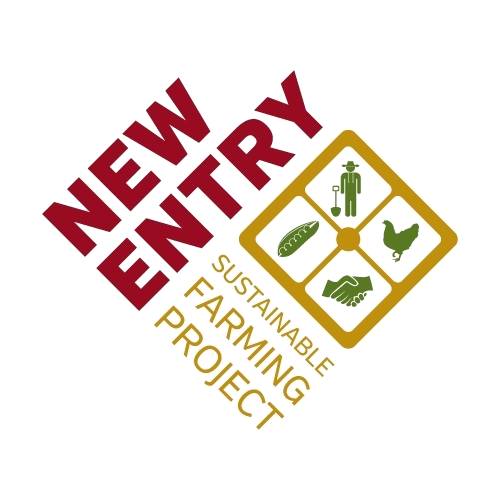
Jennifer Hashley
New Entry Sustainable founder & Local Farming Pioneer
–
–
6-part series

.

Jennifer Hashley · Your Friendly Neighborhood Superhero · episode 112
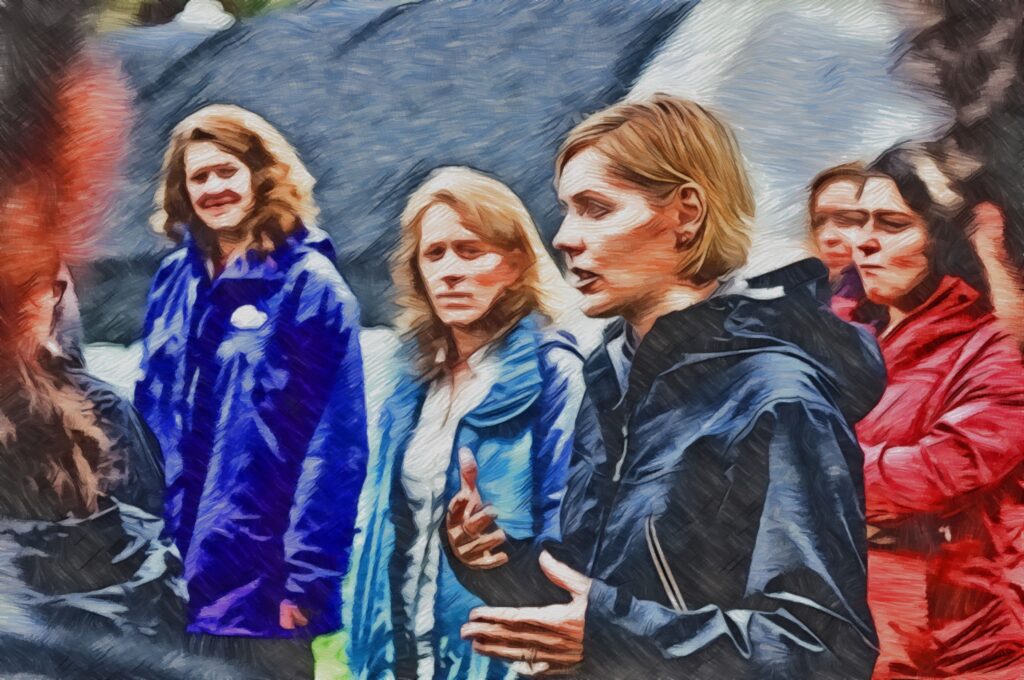
–
by: Aaron Niederhelman
A LOCAL FOOD SUPERHERO
SOURCING MATTERS
Rooted in the Tufts Friedman School of nutrition, the New Entry Sustainable Farming Project is one of the first initiatives nationwide to help immigrants and refugees develop commercial farming opportunities. Change-agent Jennifer Hashley grew New Entry into a sustained effort while she was getting her Master’s in Agriculture and Public Policy at Tufts. The goal since the beginning has been to help farmers thrive in the fields, the office and within their communities. Today, 25 years later and New Entry has established a framework that will teach anyone that’s ready to learn how to operate a successful sustainable farming business.
–
New Entry is teaching an approach to farming that could eventually become the model that everyone uses to produce food in the future. A model that is smaller scale, regional, diversified and using production that is bathed in ecological best practice.
–
Each and every food purchase from these farms is a circular dollar spent in local economies. Jobs are created, and in using this production approach the land, natural resources and nature are looked after in more responsible manner. New Entry farms are also beneficial in dealing with food waste, water and this healthy farmland sucks down and stores carbon. Additionally, farming the landscape to combat climate change is real, and as a whole local food is significantly less taxing on the environment as compared to conventional. The biggest win of all is the opportunity for more community members to eat more fresh and nutrient dense foods from nearby farms.
–
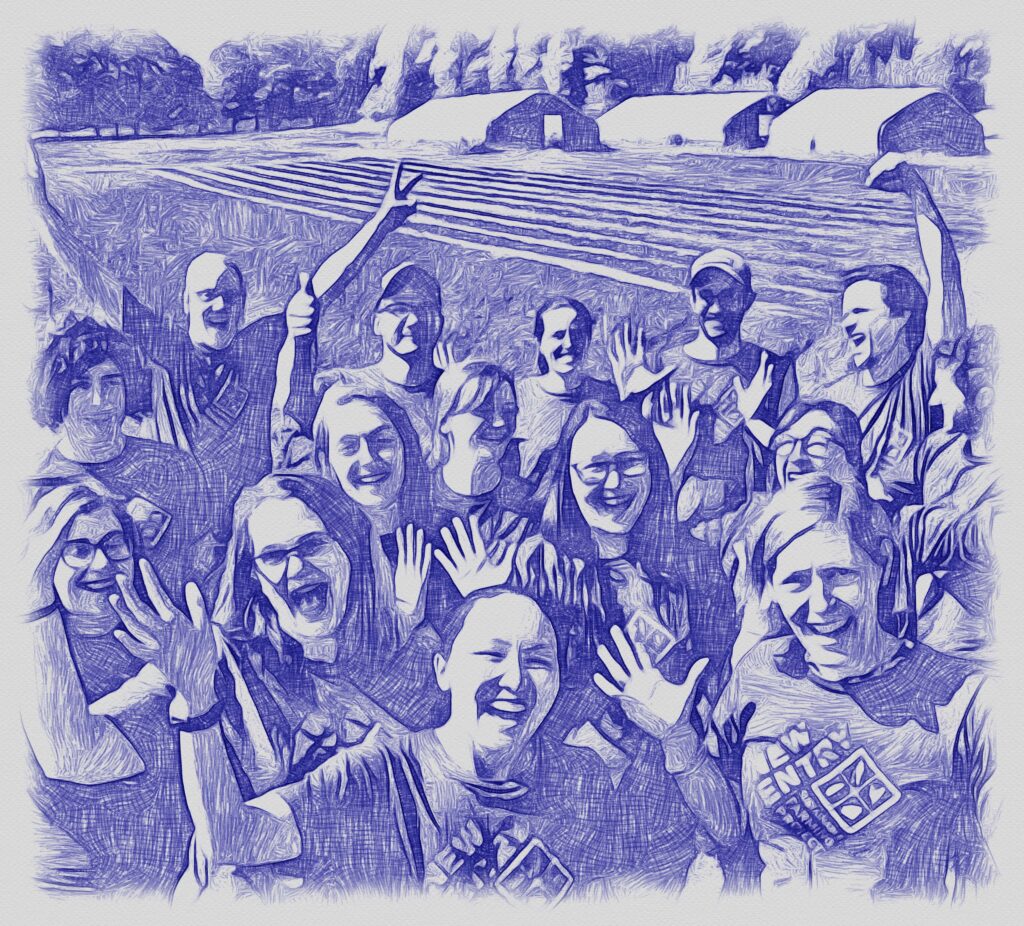
–
For others, with current geo-political instability and what was exposed as weak spots in global food supply chains during COVID, local food from regional production is actually all about guaranteeing food security for the future. More New Entry farmers on local lands helps with food surplus for any region or community. Local food is also about stability. After all, “Every society is (only) three meals away from chaos.”
–
The long and short of it, New Entry brings contemporary farmers up to speed. Jennifer has developed a system that is chock-full of creative ways to gain land access, grants and funding programs. She help farmers work with multipliers, to figure out distribution and value-ad, and they offer a network to help with staffing. This all adds up to capacity building of local and regional food production. Here we have a trained workforce that is champing at the bit to work their butts off. What’s needed is access to good land, some capital, and a community commitment to make it all grow. New Entry is infrastructure that will change food system by serving the needs and interests of this vested communities of eaters. So, tune in to hear how Jennifer is making it all happen…
–
–
–
–
WELCOME TO MY KITCHEN – VIDEO TALK SHOW SERIES

.
.
KICKING BUTT FOR A QUARTER CENTURY
Jennifer Hashley is the Trisha Pérez Kennealy and Michael Kennealy Director for New Entry Sustainable Farming Project (NESFP). Prior to becoming Director in 2006, Jennifer was the New Entry Project Coordinator for five years. Jennifer is a leader expert in local food systems work focusing specifically on beginning farmer development.
–
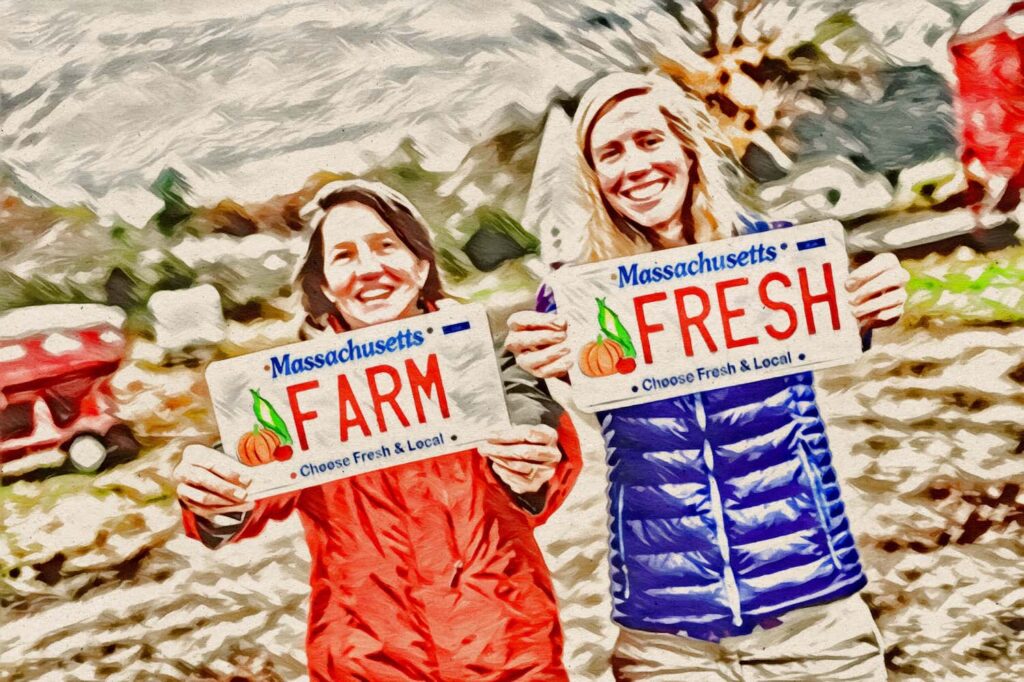
“Food security, civic engagement, social welfare, local dollars spent, fresher and higher-value nutrient dense foods (which is preventative health care, of course) and smart land use in your area is all being wrapped up by a movement of food as climate action. It’s right at the threshhold for local food,” explains Hashley.
–
Hashley’s role at New Entry has included building community partnerships, developing new programs and services, mentoring and supporting project staff, securing sustainable resources for all program operations, writing grants, strategic planning, and overseeing incubator training farm site infrastructure and a multi-year sustainable agriculture training curriculum in specialty crops and livestock production for limited resource farmers.
Where most see only the obstacles, Jennifer views hope and potential in the future of food. Jennifer is nothing short of an inspiration and a true force-of-nature.
–
–
INSIDER’S CORNER: institutional investors, public & private endowments, patient capital and family offices – owning the land that could be farmed by New Entry trained management teams is an investment opportunity of a lifetime! It’s a triple-bottom line impact investment that helps communities, and offers monitory reward via capital appreciation of the land, and cash-flow from differentiated products hitting the market. There are all kinds of wins for stakeholders supporting New Entry farms and farmers.
–
–
the local,
neighborhood,
& community
FOOD SUPERHEROES
–
FOOD PRODUCTION OF TOMORROW
For four years we’ve been on a listening tour with Sourcing Matters discussions. We’ve welcomed some of the greatest minds and innovators to chat about how to best manage the planet with future food production. We tapped into all kinds of diverse fields of study and focus areas. Every episode we’ve talked about food, agriculture, resource management and planetary stability. The consensus for how to move forward may not be what you’d expect. As it turns out, most agree that the future of food production must become based on more local foods coming from regional farms. That’s it. That’s the arena for food systems change.
–
Jennifer Hashley has joined many of these conversation as a Sourcing Matters co-host. Her breadth of knowledge, nuanced understanding of the current state of affairs and a vision for the future is welcomed as trusted voice with the chops of getting things done. For more from Jennifer Hashley – lend an ear to these select episodes:
–
ep. 44: MARION NESTLE: Waste not, Want Not
ep. 67: GOV. CHRISTINE WHITMAN: EPA & Fluid Politics
ep. 78: PAUL RICE: Fair Trade for all
—
—
–
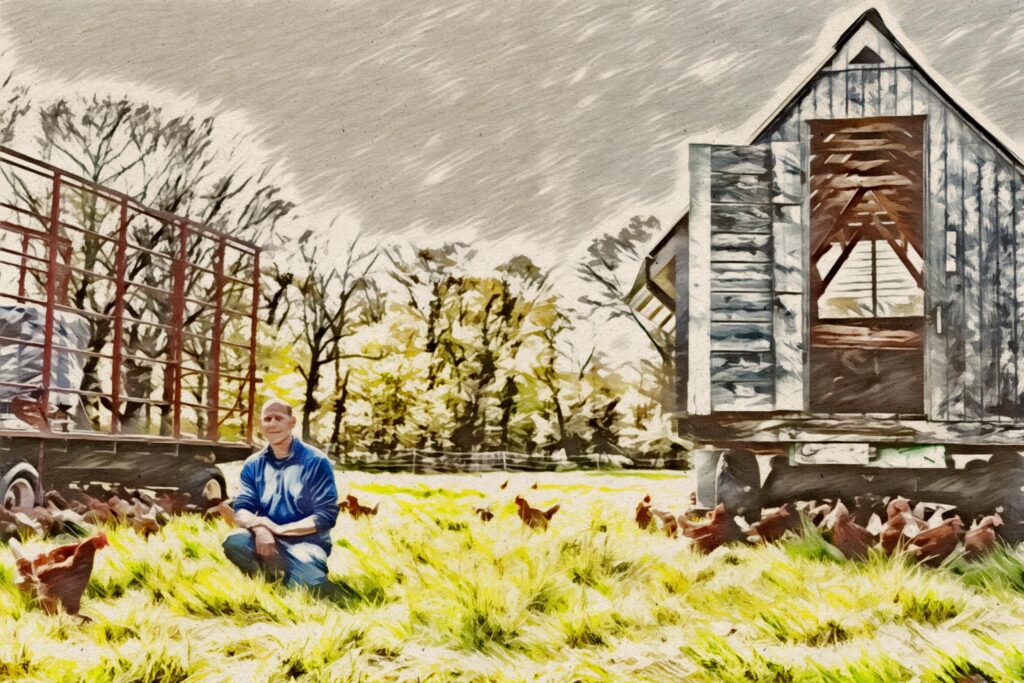
–
BETTER FOOD FOR A BETTER LIFE
With her husband Pete, Jennifer oversees a diversified pasture based livestock operation on the the renowned Codman Community Farm in Lincoln MA. They’ve also built the recognized brand ‘Pete and Jen’s Backyard Birds’ known for supreme quality, clean production, humane treatment and for delivering all around delicious proteins.
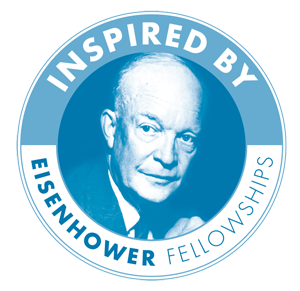
Jennifer has earned leadership awards for her food systems work, was selected as an Environmental Leadership Fellow, and an Eisenhower Agriculture Fellow. Along with those Master’s degrees from Tufts University – she holds a Certificate in Management of Community Organizations from Tufts University, a Certificate in Ecological Horticulture from UC, Santa Cruz, and a B.S. in Environmental Science and Public Policy from Indiana University.
She serves on the board of the Carrot Project, a small-farm financing nonprofit, and on the board of the Urban Farming Institute of Boston. Jennifer is also an advisor to many state and regional food systems projects addressing agricultural policy issues.
.
.
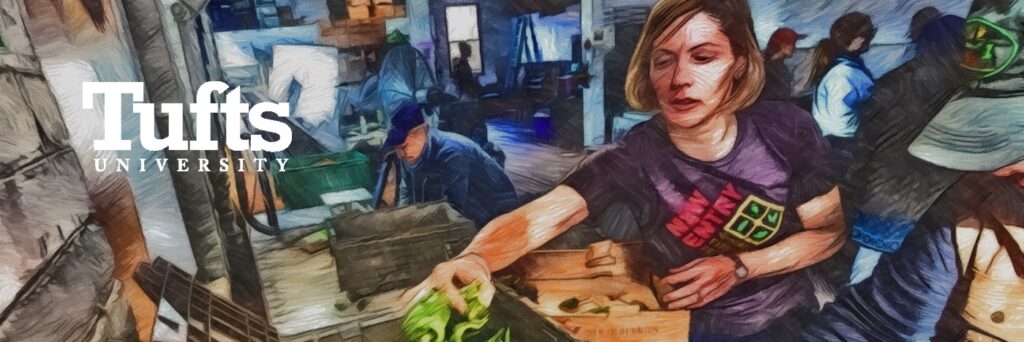
.
.
We are a beginner farmer training program. We can get people excited, they are passionate, they see a vision, they want to grow food, they want to steward the land, they want to feed their community. They want to contribute to society, but they burn out because they are not making enough money to live. To me, that is very scary. What are we doing to change that?!”

–
– Jennifer Hashley, episode 112 guest
.
.
.
FORCES OF NATURE
Jennifer Hashley
Your Local,
Neighborhood,
& Community
Food SuperHero
–
–
CALL TO ARMS
Jennifer is optimistic for the future. She wants you to share in her vision of stability through focus on production of good local food. Her call to action is to simply support the things that we believe in. Use your purchasing power of this good local food as a way to exercise those beliefs. When more of this is done in your community, more folks that you care about will benefit. That’s actually true for any community that gets a New Entry farmer to start farming for them. She’s got the IP to train a workforce and drive food systems change. So, time to break some bread with Jennifer and find out how to light this local food candle! Who wants in?
–
twitter: @JHashley
–
photo credit: Angela Klempner || NESFP || TUFTS ||
–
.
FORCES OF NATURE – series
As part of the FORCES OF NATURE series, in this episode you’ll hear from inspiring folks making good things happen to benefit the world.
.
–
.

until the next drop…

.
.
.
,.




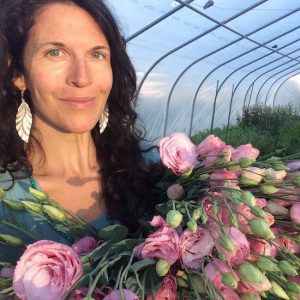 Stone Barns Center for Food and Agriculture was developed by David Rockefeller and dedicated to the memory of his wife, Peggy Rockefeller. The Stone Barns Center’s mission is to demonstrate, teach and promote sustainable, community-based food production. Open to visitors of all ages but with an emphasis on K-12 education, the Center offers a unique experience: a chance to learn about farming firsthand on a real working farm within a 30-minute drive of New York City. Livestock, chickens, vegetables, gardens, greenhouses a learning facility and cultural center demonstrate to the public the advantages of local, community-based farming and environmentally sensitive agricultural practices. The Center is also home to Blue Hill at Stone Barns, a four star restaurant that offers guests a taste of the farm and of the Hudson Valley.
Stone Barns Center for Food and Agriculture was developed by David Rockefeller and dedicated to the memory of his wife, Peggy Rockefeller. The Stone Barns Center’s mission is to demonstrate, teach and promote sustainable, community-based food production. Open to visitors of all ages but with an emphasis on K-12 education, the Center offers a unique experience: a chance to learn about farming firsthand on a real working farm within a 30-minute drive of New York City. Livestock, chickens, vegetables, gardens, greenhouses a learning facility and cultural center demonstrate to the public the advantages of local, community-based farming and environmentally sensitive agricultural practices. The Center is also home to Blue Hill at Stone Barns, a four star restaurant that offers guests a taste of the farm and of the Hudson Valley.
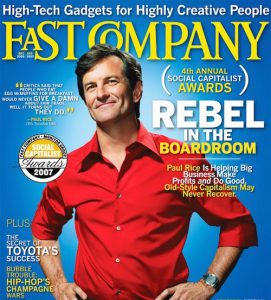 Twenty years later, Fair Trade has grown into a widely-known and increasingly mainstream consumer trend that is rapidly approaching an inflection point. In 2016, consumer recognition of the Fair Trade Certified label reached 67% and U.S. retail sales of Fair Trade products grew to an estimated $6 billion. Paul and his team have enlisted the support of over 1,300 companies, including market leaders like Green Mountain, Starbucks, Nespresso, General Mills, PepsiCo, Whole Foods, Costco, Target and Walmart. Fair Trade USA now certifies coffee, tea, cocoa, sugar, coconut, fresh fruits and vegetables. Most recently, through groundbreaking partnerships with Patagonia, West Elm and Gap Inc., Fair Trade has begun certifying apparel and home furnishings to improve working conditions and incomes for factory workers.
Twenty years later, Fair Trade has grown into a widely-known and increasingly mainstream consumer trend that is rapidly approaching an inflection point. In 2016, consumer recognition of the Fair Trade Certified label reached 67% and U.S. retail sales of Fair Trade products grew to an estimated $6 billion. Paul and his team have enlisted the support of over 1,300 companies, including market leaders like Green Mountain, Starbucks, Nespresso, General Mills, PepsiCo, Whole Foods, Costco, Target and Walmart. Fair Trade USA now certifies coffee, tea, cocoa, sugar, coconut, fresh fruits and vegetables. Most recently, through groundbreaking partnerships with Patagonia, West Elm and Gap Inc., Fair Trade has begun certifying apparel and home furnishings to improve working conditions and incomes for factory workers.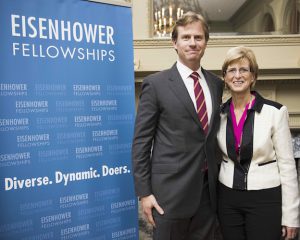 Governor Whitman is American Republican politician and author who served as the 50th Governor of New Jersey, from 1994 to 2001, and was the Administrator of the Environmental Protection Agency (EPA) in the administration of President George W. Bush from 2001 to 2003. Whitman was New Jersey’s first and, to date, only female governor, and also the first Republican woman to be reelected governor. Governor Christine Whitman is currently President of The Whitman Strategy Group (WSG), a consulting firm that specializes in energy and environmental issues.
Governor Whitman is American Republican politician and author who served as the 50th Governor of New Jersey, from 1994 to 2001, and was the Administrator of the Environmental Protection Agency (EPA) in the administration of President George W. Bush from 2001 to 2003. Whitman was New Jersey’s first and, to date, only female governor, and also the first Republican woman to be reelected governor. Governor Christine Whitman is currently President of The Whitman Strategy Group (WSG), a consulting firm that specializes in energy and environmental issues.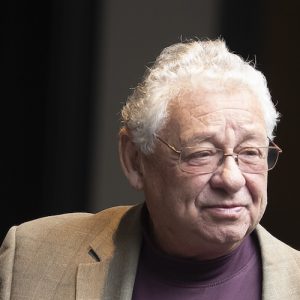 In early November 2018 Goldberg hosted The “ChooseFood” symposium in Baltimore. It was a gathering to evaluate some of the core ethical questions of food and its production. Top brass speakers shared insight on ethics of in food labor, environmental impact, externalities, animal welfare, health risk factors & new tech – all were on the docket. Coming it at from the food animal side It was a fascinating exercise for me to see how far we’ve come since the 2007 PEW commission report, what more needs to be done with food animal production, and how broad the aperture has grown to encapsulate ethics into our food and global production.
In early November 2018 Goldberg hosted The “ChooseFood” symposium in Baltimore. It was a gathering to evaluate some of the core ethical questions of food and its production. Top brass speakers shared insight on ethics of in food labor, environmental impact, externalities, animal welfare, health risk factors & new tech – all were on the docket. Coming it at from the food animal side It was a fascinating exercise for me to see how far we’ve come since the 2007 PEW commission report, what more needs to be done with food animal production, and how broad the aperture has grown to encapsulate ethics into our food and global production. Joining us for the 45 minute discussion is The Carrot Project founder and Executive Director Dorothy Suput. Suput’s commitment to a sustainable food system grew out of the incredible contrasts between Midwestern agriculture, with which she grew up, and the locally focused food and farming system in Switzerland, where she lived after graduating with a BS from Purdue University. Following graduate school at Tufts, Dorothy worked as the first regional organizer on the 1995 Farm Bill for the Northeast Sustainable Agriculture Working Group under the auspices of the Campaign for Sustainable Agriculture, and subsequently, as a consultant for business and agency.
Joining us for the 45 minute discussion is The Carrot Project founder and Executive Director Dorothy Suput. Suput’s commitment to a sustainable food system grew out of the incredible contrasts between Midwestern agriculture, with which she grew up, and the locally focused food and farming system in Switzerland, where she lived after graduating with a BS from Purdue University. Following graduate school at Tufts, Dorothy worked as the first regional organizer on the 1995 Farm Bill for the Northeast Sustainable Agriculture Working Group under the auspices of the Campaign for Sustainable Agriculture, and subsequently, as a consultant for business and agency.
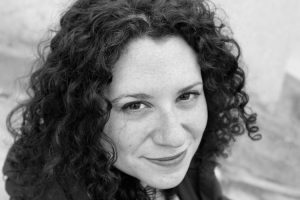 Bringing 24,000 concert goers to Hartford in September- the 2018 Farm Aid event was a smashing success. Featuring Farm Aid founder Willie Nelson, John Mellencamp, Dave Matthews, Neil Young, Sturgill Simpson and many more – this gathering amplifies the needs, and helps define current state of farming in this county. Alicia Harvie and Jennifer Harvie describe their moving experiences during both the main concert event and the field visits and pavilion days leading up to the top billing.
Bringing 24,000 concert goers to Hartford in September- the 2018 Farm Aid event was a smashing success. Featuring Farm Aid founder Willie Nelson, John Mellencamp, Dave Matthews, Neil Young, Sturgill Simpson and many more – this gathering amplifies the needs, and helps define current state of farming in this county. Alicia Harvie and Jennifer Harvie describe their moving experiences during both the main concert event and the field visits and pavilion days leading up to the top billing.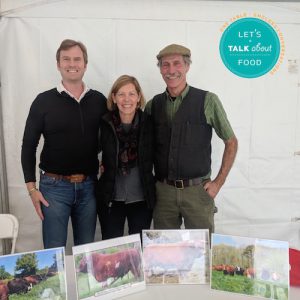 Sourcing Matters ep. 41: “Systems Thinking in food production”– live recorded at the “Let’s talk about Food” festival at Harvard University – looks at harmonizing with more natural systems, and evaluates better management practice that could be used to produce our food in the future. Host Aaron Niederhelman will guide the discussion to cover diverse topics. Not the least of which a process that’s being used to sequester carbon through reengaging the natural system of our living soils – on the hoof. Additionally, one of the most under valued workforce in food production – pollinators. And, it’ll be a conversation that clearly detail how what you eat is the most impactful vote you have to positively benefit your health and that of your family, to increase global stability and to mitigate climate change. So, If you’re an environmentalist, a humanitarian, a patriot, a doctor, or even that you just want to look and feel better – tune-in and learn how your grocery budget can change the world.
Sourcing Matters ep. 41: “Systems Thinking in food production”– live recorded at the “Let’s talk about Food” festival at Harvard University – looks at harmonizing with more natural systems, and evaluates better management practice that could be used to produce our food in the future. Host Aaron Niederhelman will guide the discussion to cover diverse topics. Not the least of which a process that’s being used to sequester carbon through reengaging the natural system of our living soils – on the hoof. Additionally, one of the most under valued workforce in food production – pollinators. And, it’ll be a conversation that clearly detail how what you eat is the most impactful vote you have to positively benefit your health and that of your family, to increase global stability and to mitigate climate change. So, If you’re an environmentalist, a humanitarian, a patriot, a doctor, or even that you just want to look and feel better – tune-in and learn how your grocery budget can change the world.